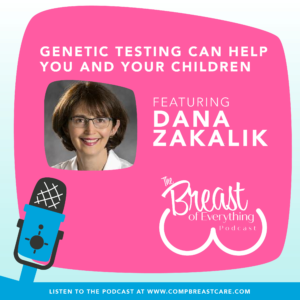Dr. Dana Zakalik on
learning more about genetic testing can help you and your children
“Through early detection of mutations, we can help manage and even reduce a patient’s risk,” Dr. Zakalik reports. “In addition, patients can tell their family members they may be at risk so they, too, can make informed decisions.”

What is genetic testing and what does it mean for cancer patients? During The Breast of Everything podcast, Dana Zakalik, MD, a medical oncologist and medical director of the Nancy and James Grosfeld Cancer Genetics Center at Beaumont Hospital in Royal Oak, Michigan, talks about genetic testing, why it is important and how the newest advances in cancer treatment promise to make a significant impact on patient outcomes.
She begins the podcast by talking about the genetic mutations inherited from family members that can increase a person’s risk for breast cancer. Through a genetic test, clinicians can learn what those mutations are and what options are available for patients. The test is simple, Dr. Zakalik notes. The patient gives a blood or saliva sample that is sent to a lab specializing in hereditary genetics. The findings then are sent back to the patient’s physician.
“Through early detection of mutations, we can help manage and even reduce a patient’s risk,” Dr. Zakalik reports. “In addition, patients can tell their family members they may be at risk so they, too, can make informed decisions.”
Years ago, testing was so much easier, Dr. Zakalik explains, because clinicians only tested for the two known genetic mutations – BRCA1 and BRCA2. Today, there are more than 80 genes that can be tested. As a result of new technology, this number has exploded.
Scientific advancements, and more efficient, faster and less costly tests have changed the genetic counseling world dramatically, the genetic specialist finds.
When patients receive the genetic findings, they do have options, the medical oncologist reports. This is not a one-size fits all for patients. Imaging has improved dramatically over the years, which can lead to earlier detection. “We have many tools in our toolbox for patients,” she notes, adding that patients should consider other risk factors such as weight, lifestyle, level of exercise and hormone replacement therapy for example.
What Dr. Zakalik is most excited about are the advances in drug therapy for people with certain gene mutations. “This is a big, exciting development in cancer genetics because it can improve patient outcomes,” she is happy to report.
To hear about these new developments in cancer genetics, listen to The Breast of Everything podcast in its entirety with Dr. Zakalik and hosted by Comprehensive Breast Care Surgeons Eric Brown, MD, FACS; and Linsey Gold, DO, FACS, FACOS.
